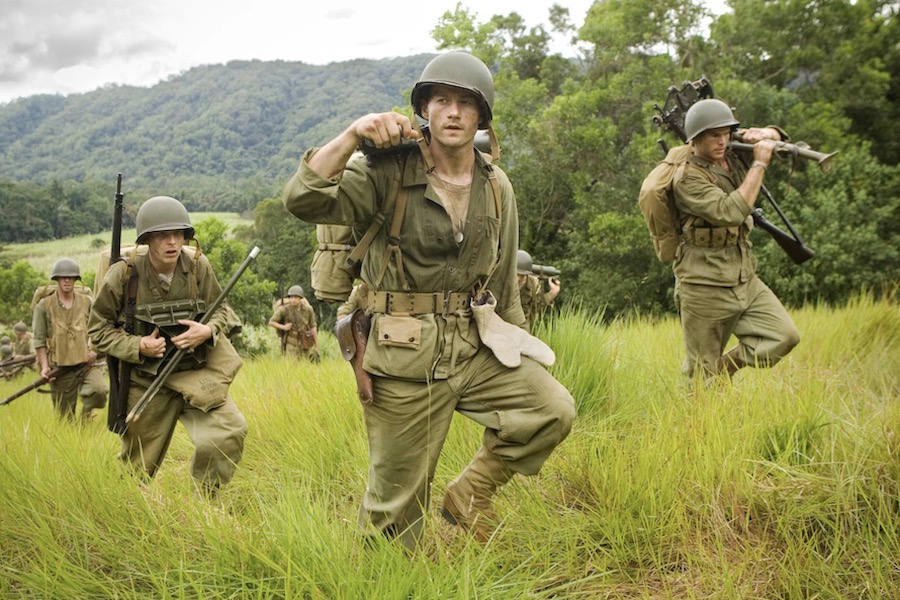ABOVE AVERAGE
HELL WAS AN OCEAN AWAY.

After producing the successful limited series Band of Brothers in 2001, Steven Spielberg and Tom Hanks knew that they were not finished with World War II. They had just portrayed the European theater of war from the perspective of the grunts – the same thing could and should be done with the Pacific. In the end of Band of Brothers, some of the soldiers shipped out to the Pacific after winning the war in Europe, but Spielberg and Hanks found new veterans to base another limited series on. Facing high expectations, The Pacific lived up to its promise.
Enlisting the day after Pearl Harbor
We follow a group of men who have been stationed with the 1st Marine Division. Robert Leckie (James Badge Dale) is a young writer who enlists the day after Pearl Harbor. Eugene Sledge (Joseph Mazzello) wished to join the Marines on the same day as his friend Sidney Phillips (Ashton Holmes), but couldn’t because of a heart murmur; in the fall of 1942, he is finally able to begin military training and ends up in the same division as Sidney. Sergeant John Basilone (Jon Seda) was already in the Army at the outbreak of the war and was shipped to the Pacific after transferring to the Marines in 1940.
The first major battle fought by the 1st Marine Division is the one at Guadalcanal where Basilone does such a fine job of holding the lines against a Japanese assault that he is awarded a Medal of Honor. The subsequent battles of Peleliu, Iwo Jima and Okinawa will strain not only the men’s physical health, but their sanity and moral compass as well.
Overwhelmingly raw battle sequences
The structure of this limited series is similar to that of Band of Brothers; the characters are based on real-life people and their accounts of what took place in the Pacific theater. Each episode begins with veterans commenting on what we’re about to see. The look and feel of the project has a cinematic quality, with overwhelmingly raw battle sequences. Band of Brothers shifted looks as the troops moved through France and Germany; hamlets, fields, forests and snowy mountains provided the backdrop. In The Pacific, few things change; the sun is either burning or giving way to torrential rain, mosquitos torment the troops and blood is spilled on sandy beaches and in leafy jungles.
Heartbreakingly beautiful, but the lack of variation in these places becomes another obstacle to the soldiers, hand in hand with the determination of the Japanese who made sure the war dragged on for another four months after Germany’s surrender. The expected themes of inhumanity are present throughout the series, as well as thoughts on courage.
The series finale also shows with compassion the challenge of adapting to life after the unspeakable horrors of the war
As in Band of Brothers, it takes time before one invests emotionally in the characters, but the story of how Basilone met his wife-to-be is movingly staged in the eighth episode. The series finale also shows with compassion the challenge of adapting to life after the unspeakable horrors of the war.
Those who get a kick out of the majestic treatment that we all know goes hand in glove with a Spielberg/Hanks production budgeted at $150 million will love the opening titles. Gorgeously designed as a battlefield sketch where the charcoal resembles the black sand of Iwo Jima, the titles are accompanied by an irresistibly majestic theme by Hans Zimmer.
The Pacific 2010-U.S. 540 min. Color. Developed by Bruce C. McKenna. Books: Eugene Sledge (“With the Old Breed: At Peleliu and Okinawa”), Robert Leckie (“Helmet for My Pillow”). Theme: Hans Zimmer. Cinematography: Remi Adefarasin, Stephen F. Windon. Cast: James Badge Dale (Robert Leckie), Joseph Mazzello (Eugene Sledge), Jon Seda (John Basilone), Ashton Holmes, Rami Malek, Josh Helman… William Sadler, Jon Bernthal. Narrated by Tom Hanks.
Trivia: Originally shown in ten episodes; Carl Franklin directed one of them. Co-executive produced by Hanks and Steven Spielberg.
Emmy: Outstanding Miniseries.
Last word: “We did give The Pacific a different look. There was a very strong, desaturated quality to Band of Brothers. In The Pacific, it was blue skies. They weren’t fighting in overcast weather. Sometimes monsoons would come in and it was terribly rainy and muddy and you couldn’t see the hand in front of your face, but it was a blue-sky war. It was a hot, dry, humid blue-sky war. So, there are more vivid colors in The Pacific than we ever had in Band of Brothers because that was the way it was, when you read the books and talk to the survivors of those campaigns.” (Spielberg, Collider)
